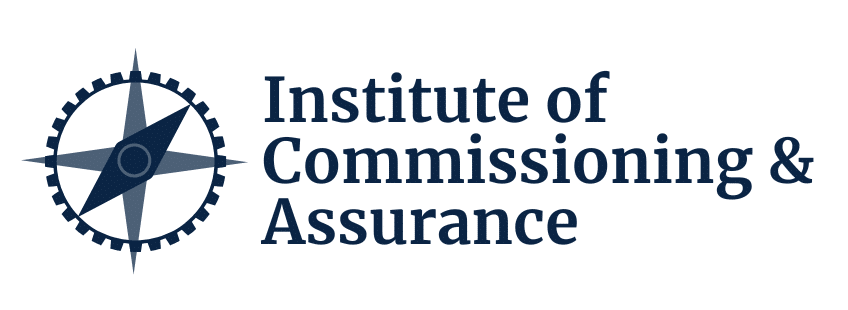Projects must embrace systems-based completions to have a structured approach to completing commissioning. The problem is that many projects don’t do this or try to implement it too late in the project life cycle. Listen to this episode to understand a systems-based approach to projects and how you can set your projects up for success.
Welcome to this week’s episode. One of the largest problems or challenges in the industry is that many groups are unfortunately working in silos. Design, construction, and commissioning are doing their best work, but they’re not necessarily integrated, coordinated, or working together. The only way to do that is to have a systems-based approach when planning for projects, and that’s what we’re going to talk about today: a systems-based approach and how to start with the end in mind to ensure a smooth transition from construction to commissioning. If you haven’t already, become a member of the Industrial Commissioning Association. You can get access to the global commissioning standard and several other resources that show you everything we’re discussing today and how to structure new projects for success at icxa.net/join. As we go through this presentation, if you have any questions or comments, please shoot them in the chat, and we’ll be sure to answer them at the end of the discussion. I’ll go through each of your questions to ensure you have the commissioning information you need. It’s no secret that the construction industry is broken; it’s a failed industry and has been for decades. Data shows that nine out of ten projects are late and over budget. The problem is that projects are often focused on individual tasks, very siloed, instead of the intended outcome, which is successful commissioning and startup to deliver high-quality systems for decades of reliable operation. When you think of major tasks on a project, construction is a big one, but it’s not the end outcome.
The focus of projects right from the beginning should be successful commissioning, focusing on outcomes rather than tasks. I believe commissioning is the key to project success. By focusing on commissioning, we can deliver successful projects, the reason for the investment to build the project in the first place. Commissioning folks are the only ones who can fix the broken construction industry because others have tried and failed for decades. Commissioning isn’t just about testing; it’s about leading. It’s the strategy to make projects successful. Everyone on this call, you are the commissioning leaders the industry needs to deliver successful projects. Commissioning is the grand master, the conductor orchestrating all project pieces, ensuring everyone focuses on the intended outcome. Imagine a symphony where the strings and wind instruments play individually—it sounds terrible. You need the conductor to ensure everything is planned and comes together successfully.
The way to do that is by embracing a systems-based approach, which is missing on many projects. If you’re working with groups that want to collaborate and plan an integrated approach, you can plan for success. But groups that work in isolation, wanting to get in and out without interference or discussion, won’t work for a systems-based approach. Commissioning is missing a leadership function at the beginning of projects to set them up with this approach. My goal with the Industrial Commissioning Association is to create a new approach with the ICA global commissioning standard, which we’ve released. It’s available for everyone to download and apply to projects right away, and I encourage you to do so. Another goal is to raise a new generation of commissioning leaders to lead projects to success. Without commissioning leaders, we’ll struggle to deliver on expected outcomes. My primary goal is to turn projects into success stories, not more case studies of failures. With global ambitions for climate initiatives, decarbonization, and electrification, trillions of dollars are to be invested in projects. We must deliver the world we want with successful projects, not the industry standard of nine out of ten being late and over budget.
Why do we need a systems-based approach? Projects are complex, with many moving pieces, people, and equipment, becoming more integrated with digital logic controls and remote operations. We need a structured systems-based approach to pull these items together so they work in the end. Siloed disciplines working individually lead to missed interfaces, delays, and risks because project handovers aren’t planned correctly. With systems-based thinking, we can break down complex projects and complete them logically in chunks as systems are started and integrated. This must be planned in advance, but many projects don’t think this way at the beginning, and it’s not integrated into contracts, leading to unsuccessful outcomes.
So, what is a systems-based approach? The mindset needs to focus on complete systems, not just installed components. Construction naturally thinks about installation by discipline—electrical, mechanical, or control protection—but individually, these don’t form a system and aren’t useful on their own. For example, a chemical dosing system comprises pipes, pumps, motors, digital logic, and dosing elements, forming a system. Completion should be by system, not discipline or area-based, which doesn’t align with project work breakdown structures (WBS) or construction’s advanced work planning (AWP). We need to transform that focus to systems for logical completion, aligning WBS and AWP with a systems-based approach. This isn’t agile or sprint; it’s strictly grouping project aspects by system for logical completion through commissioning workflows. This is complex and requires upfront planning. A critical phase in the commissioning handover model is construction completions, around 60 or 70% complete construction, where the transition from area-based construction to systems-based completions must occur. Many projects miss this, and production folks focus on their work, uninterested in others dictating workflows.
Commissioning folks arriving later trying to implement changes doesn’t work—it must be planned in contracts upfront so everyone knows how to align with commissioning and startup. The ICA global commissioning standard defines this transition: construction activities install by area, optimizing sequences and long-lead equipment delivery, but then transition to systems-based completion to complete project portions by system. This alignment of construction completions with required systems and sequences for commissioning and startup is critical. Contracts must define these sequences, not just by large systems like a 230kV AC switchyard, but by specific bays and energization sequences. If construction groups lack experience with systems-based completions, they’re not qualified to work on projects. We need to award contracts to groups understanding and aligning with commissioning requirements. CMS software is another tool, defining project systematization and managing construction completion packages through gated commissioning workflows, ensuring nothing is missed and everyone knows what’s required. The construction-led approach hasn’t worked for decades. A commissioning-first approach with systems-based completion planned at the beginning is the only way to structure projects for success, requiring commissioning leadership from everyone on this call to shape projects correctly.
We can’t continue with cowboy commissioning, a mad scramble at the end. Projects need a systems-based approach to be successful, and commissioning folks must lead this change to hand over a better world. Resources like the ICA global commissioning standard at icxa.net/join, our commissioning course lineup at icxa.net/courses, and a brochure at icxa.net/brochure can help apply these principles. Hey, Peter, good to see you. So, next week’s presentation, Peter and I are going to discuss the role of the project commissioner. You’ll definitely want to catch next week’s episode as well where Peter and I will discuss the importance of how the role of the project commissioner really sets up project success right from the beginning with this systems-based approach. We’ll have that discussion next week this time, so definitely check that out. I do want to stress the importance of this. You hear from many people on projects saying that commissioning folks need to be involved early in projects. This is the principal and primary reason: so projects can be set up with a systems-based approach and plan for project success right at the beginning.
Commissioning isn’t just testing at the end. Everything we’ve talked about requires upfront planning to make that transition from area-based construction to systems-based completion. This is the principal reason commissioning folks need to be involved early in projects: to plan this out, plan this in contracts, plan this out with other groups on projects, and take a holistic approach to project success rather than the siloed approach we’ve been taking on projects for years. I appreciate everyone joining in this week’s episode and definitely check out next week’s episode where Peter and I will have a chat and discuss the role of the project commissioner. I’ll send that link out very soon, and I hope to see you there. Alright, thanks everyone for joining and have a great day!


Recent Comments